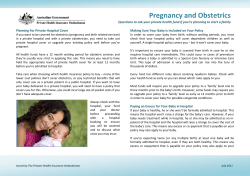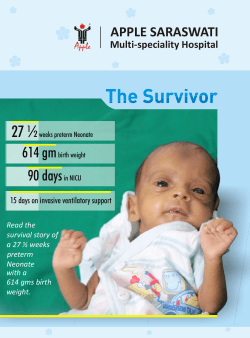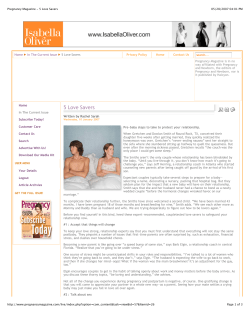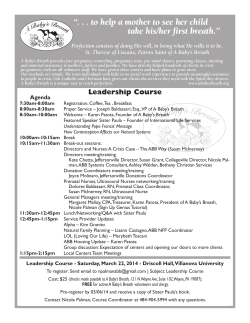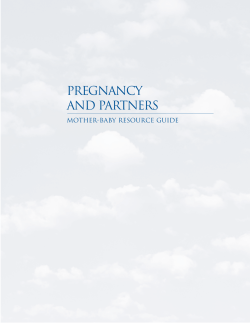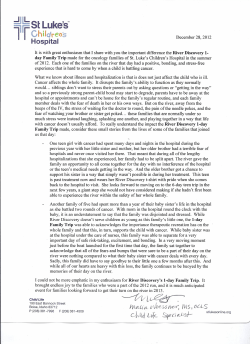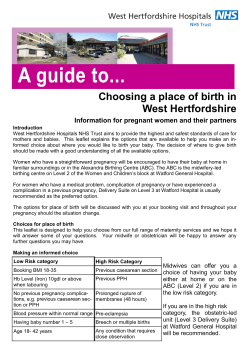
Prenatal Guide We Welcome You
Prenatal Guide We Welcome You Welcome from the President 1 Preparing for Your Hospital Stay 2 Interpreter Services Childbirth Education Classes Childbirth Options Anesthesia Antenatal Care Unit Neonatal Intensive Care Unit/Special Care Nursery Choosing a Pediatric Care Provider Parenting Newsletter Website CarePages Arriving at the Hospital When to Arrive What to Bring Parking Admissions Forms Cord Blood Banking During Your Stay Visiting Hours Patient Information Length of Your Hospital Stay Hospital Safety Participation in Research Programs Women & Infants Auxiliary Use of Video and Photography Equipment Smoke- and Tobacco-Free Campus Baby Care Reference Guide Rooming-In Treatments and Vaccinations Car Seat Safety Legal and Business Information Basic Daily Charge Itemized Charges Insurance Coverage Financial Counseling Consent Forms Campus Map Telephone Directory 4 6 8 10 12 BC Dear Patient, Established in 1884, ours is a history rich in caring for women and their babies. Our mission is to provide you, your baby and your family with the best possible care. We don’t have to look far to realize why we do this a glance into a labor room, where a couple will soon celebrate a new arrival, a peek into an incubator at a precious face yawning and stretching, the joy of watching a new family head home together. These are moments that say “This is why we do what we do.” Hospital employees experience such moments every single day. We know the birth of a baby is a very special occasion, and we are honored to be a part of it. We have created this book to help you prepare for your stay. Once you are here, we will give you a Guide to Patient Services which contains information about cafeteria hours, telephone and television service, and various programs to meet your emotional and spiritual needs as a patient and a parent. We want to help you prepare for the birth of your baby and offer a full range of pregnancy and parenting classes. For more information or to arrange a tour of the hospital, call Health Education at (401) 276-7800. A virtual tour is available at www.womenandinfants.org. Our goal is to exceed your expectations. We believe that caring for you means including your family in the process. It’s our patient- and family-centered approach to health care. If you have concerns or suggestions, we’d love to hear them. Please call the Patient Representative at (401) 274-1100, ext. 4968. You may be randomly selected to receive a survey at home asking your opinion of Women & Infants. Please let us know what we are doing well and where we can improve our care for you and your family. We look forward to caring for you and wish you a pleasant stay at Women & Infants Hospital. Sincerely, Constance A. Howes President and Chief Executive Officer 1 Interpreter Services Preparing for Your Hospital Stay Interpreter Services Women & Infants serves patients from many different cultures. We want to communicate with you in the language in which you are most comfortable. If you prefer to communicate through an interpreter, please tell us. The hospital will provide an interpreter at no cost. Sign language interpreters are available for the hearing impaired. Childbirth Education Classes Women & Infants offers many classes taught by experienced, certified childbirth educators who can answer your questions and help you prepare for childbirth. Childbirth Education Classes Childbirth Options Anesthesia Antenatal Care Unit Neonatal Intensive Care Unit/ Special Care Nursery Choosing a Pediatric Care Provider Parenting Newsletter Website CarePages Classes are offered at various times and locations, including our main campus in Providence and Centers for Health Education in East Greenwich, Woonsocket, Swansea, South Kingstown and North Attleboro. If you have not received a registration form, visit www.womenandinfants.org or call Health Education at (401) 276-7800, ext. 100. Childbirth Options Alternative Birthing Center (ABC) The ABC offers a cozy setting that can include older children and others. Located in our Labor/ Delivery/Recovery unit on level 2, the ABC offers minimal hospital intervention but maximum assurance of safety. It features a comfortable bedroom where the birth takes place. After you deliver in the ABC, you can: • Recover for four hours there, and transfer to a mother-baby unit. • Recover for six to 12 hours there, and go home once you and your baby meet discharge criteria. This early discharge includes a home visit from a nurse who will assess you and the baby and offer support. For more information, call the ABC at (401) 274-1122, ext. 1830. Labor/Delivery /Recovery Rooms (LDRs) The LDRs offer you a place to labor, deliver and recover in one room, with your birth partner at your side. We have 19 LDRs with the latest technology and one whirlpool tub room on level 2. Cesarean Birth There are three operating rooms on level 2 if you need a Cesarean birth. Your partner can stay with you during the birth unless there is an emergency. We also offer a recovery room for Cesarean births. Rhode Island state law asks that we outline our Cesarean birth rates for the past three years. 2 Total Primary Repeat 2007 32.3% 22.7% 86.3% 2006 32.2% 23.2% 86.1% 2005 31.2% 22.2% 83.8% Anesthesia Members of the Department of Anesthesiology want to make sure you are informed about your options to make the best decision for you. They know some women want medication to help relieve their discomfort and others may not. They can help you decide which option is best for you and will be on hand during your delivery even if you choose not to have anesthesia. You can learn more about anesthesia in childbirth through childbirth education classes. Visit www.womenandinfants.org or call Health Education at (401) 276-7800, ext. 100. Antenatal Care Unit Sometimes, women with high-risk pregnancies are hospitalized before delivery to monitor their health and the health of their unborn baby. Those women are cared for in our Antenatal Care Unit in the new South Pavilion. The unit provides comprehensive inpatient care in an effort to achieve the best possible outcome for mother and baby. The rooms are larger with private bathrooms. The unit also features an amenities suite to pamper women spending weeks on bed rest. There is exercise equipment, a washer and dryer, and a hairdressing sink and massage table for appointments. Neonatal Intensive Care Unit/Special Care Nursery We operate the largest single-room neonatal intensive care unit (NICU) in the country, offering outstanding care for 1,300 premature and sick babies each year. The single-room layout, which is on two floors in the hospital’s new South Pavilion, offers the latest technology and most advanced care in a quieter, more private setting for families. Our team includes: care managers, neonatal nurse practitioners and nurses, neonatal-perinatal fellows, neonatologists (pediatricians with additional training in newborn care), nutritionists, occupational therapists, pharmacists, respiratory therapists, and social workers. The unit offers plenty of space for families, with lounges on each floor, a full kitchen, shower facilities for parents, and a two-story family resource center that includes computers, a 16-foot salt water aquarium, and brightly-lit seating areas. Choosing a Pediatric Care Provider You must choose a pediatric care provider – a family practitioner, pediatrician or nurse practitioner – before you are 35 weeks pregnant. To help you choose someone, we developed a brochure “Choosing a Pediatrician.” For a copy or the name of a pediatric care provider, visit www.womenandinfants.org or call our Physician Referral Health Line at 1-800-921-9299. Tell your physician/midwife and the hospital when you choose a provider for the baby so we can call him/her when the baby is born. If your pediatric care provider does not come to Women & Infants, our team of doctors will care for your baby. Parenting Newsletter As you prepare for the birth of your baby, we have an e-newsletter that can help. The Parent Review is our free weekly parenting email newsletter for expectant and new parents. To sign up, go to www.womenandinfants.org. Website Our website (womenandinfants.org) offers information about hospital services, a pregnancy planner, a virtual tour of our birthing facilities, an updated listing of educational programs and support groups, information about health care providers and clinical trials, a health encyclopedia, and access to My Personal Health Record, a secure way to keep track of your health information. CarePages CarePages is a free, personal, private web page service. You can build a page to help you stay connected with family and friends before, during and after hospitalization. The service allows you to email updates about your health. Your friends and family can support you through messages, virtual gifts and more. Go to www.womenandinfants.org and click on CarePages to start your own. 3 When to Arrive Arriving at the Hospital When to Arrive If you think you may be in labor, call your doctor/midwife, who may tell you to come to our Emergency Triage unit to be checked. Call our Admitting Office at (401) 274-1122, ext. 1422, to let them know you are on your way. What to Bring Parking Admission Forms Cord Blood Banking If you are in active labor, you will be evaluated by a physician or midwife and may then be transferred to the Labor/Delivery/Recovery room area. Patients in Emergency Triage are seen according to their medical need, so those with the most serious problems are seen first. What to Bring During your stay, Women & Infants will provide hospital gowns for you and clothing for your baby. You may also want to bring: • • • • • • • • • • • Toothbrush and toothpaste Deodorant Shampoo Soap Nightgown Robe Slippers Shower shoes Breastpads Comfortable bras and underpants Clothing for you and the baby to wear home and for baby’s first photo For your peace of mind, never bring large sums of cash, credit cards or other valuables such as jewelry and personal electronic devices such as cell phones and ipods. The hospital cannot store your valuables and is not responsible if they are lost. Parking Patients with an emergency may park near the Emergency Triage entrance. After you are admitted, please have your partner move the car to the visitor parking lot. The visitor parking lot is located opposite the Emergency Triage entrance of the hospital. There is a nominal fee for parking in this lot. Patients and visitors with a United Health card with an anchor in the upper right hand corner, a white Rhode Island medical card with an anchor in the center, a Neighborhood Health Plan card, or a state welfare card are eligible for free parking. The cards must be displayed when requesting free parking. When you are being discharged, we offer free valet parking at the main entrance. Valet attendants can also check the installation of your infant car seat. Valet parking is available from 7:30 am to 4:45 pm, Monday through Friday. 4 Admission Forms Admitting staff will ask you to verify the personal and financial information submitted by your health care provider. You must also sign admission forms and provide: • • • • Positive identification, such as a license Your insurance card(s) Name of the pediatric care provider Consent for first portrait of your baby You may also provide copies, if you have them, of a Living Will (written document stating your wishes for withholding or withdrawing medical care or treatment if your condition becomes terminal) or Durable Power of Attorney (written document that appoints someone to make health care decisions for you). You can get these forms through the Admitting Office, (401) 274-1122, ext. 1422. Contact your attorney with any legal questions. Cord Blood Banking If you are interested, you can donate your cord blood to a public cord blood bank. It will be processed, tested, frozen and stored at no cost to you. Public cord blood is made available to patients anywhere in the world through the National Marrow Donor Program and other international networks. When a donor is needed, the cord blood is quickly shipped to the patient for transplant without delay. For information about public cord blood donation, please call the Rhode Island Blood Center at 401-248-5768 or email cordblood@ribc.org. Patients may also choose to donate their cord blood to a private cord blood banking program. Please have the appropriate materials when you deliver, and we will make every attempt to collect the sample from the cord for you. You would then be responsible for sending this to the bank. 5 Patient Information During Your Stay Patient Information While you are in the hospital, your family and friends can call (401) 274-1122, ext. 1374 to learn if you are a patient here. Due to the Patient Privacy Act, we do not give out specific information regarding your care or condition. If do not want any information released, tell your doctor or primary nurse. Length of Your Hospital Stay Hospital stays are relatively short. This is not dictated by you or the hospital, but by your medical condition and health insurance plan. Discharge time is by 11 am. Arrange transportation in advance so you will be ready to go home. Visiting Hours For the safety and comfort of our patients, hospital policy limits visitors to four people at a time during regular visiting hours. All visitors, except brothers and sisters of the new baby, must be 14 years of age or older. We encourage visits from family and friends, but our primary concern is that you get the care and rest you need to recover. Please limit visitors to the following times: Length of Your Hospital Stay Visiting Hours Hospital Safety Patient Representative Women & Infants Auxiliary Use of Video and Photography Equipment Smoke- and Tobacco-Free Campus Participation in Research Programs Maternity Units Baby’s father/your significant other.........24 hours a day Brothers/sisters of the new baby . .........12 noon to 8 pm (with a sibling visitor sticker) Grandparents............................................ 12 noon to 8 pm (after first visit) Neonatal Intensive Care Unit/Special Care Nursery Parents/grandparents.............................. Follow unit guidelines Brothers/sisters of the new baby............ Through the Kids’ Klub Labor Room No visitors are allowed except your significant other/father of the baby or coach. To help keep our patients healthy, please ask your visitors to stay home if they have any symptoms of a cold or diarrhea, or have recently been exposed to chicken pox, measles, mumps, rubella or the flu. Overnight Visitors If the father of your new baby or your significant other wants to spend the night, the chair in your room reclines. Nurses can provide blankets and pillows, but not toiletries. In addition, the showers in the room are for patient use only. Ask your visitors to wash their hands – with soap and water if their hands are visibly dirty or with alcohol-based hand gel – before hugging you or touching your baby. 6 Hospital Safety The hospital follows measures to protect patients’ safety during procedures and surgery. Examples include: • Having staff identify each patient by asking the name and checking the identification bracelet • Having staff ask what procedure you are having • Having staff mark the procedure/surgery site • Possibly giving you antibiotics before a procedure or surgery to prevent infection Handwashing is the best way to prevent passing colds or infection. Everyone, including children, should wash their hands thoroughly when visiting. Use an alcohol-based hand gel like Purell. Dispensers are located throughout the hospital. If your hands are visibly dirty, use soap and water to clean them. Electronic devices are generally prohibited in the hospital so we can maintain a safe environment for all our patients. Patients are not allowed to bring most portable electric appliances – heating or cooking devices, electric fans, portable air conditioners, and coffee pots – to the hospital. Patient Representative To help promote patient- and family-centered care throughout your hospital experience, Women & Infants offers a patient representative who acts as a liaison between you, your family, hospital staff and administration. The patient representative addresses your rights, concerns and complaints, answers questions, and lets you and your family know about the services that are available to you. Contact the patient representative at (401) 274-1122, ext. 4968. Women & Infants Auxiliary The Women & Infants Auxiliary offers the following services: • Baby’s first photo • Gift shop • Nursing Moms, Etc., a store for nursing mothers and newborns All proceeds generated from these services are donated to the hospital. If you would like more information, call the Auxiliary Office at (401) 274-1122, ext. 2029, or visit www.womenandinfants.org. Use of Video and Photography Equipment At the request of our medical staff, we cannot let you use video and audio equipment in the Alternative Birthing Center, labor/delivery/recovery rooms, operating rooms, and circumcision room during delivery or a medical procedure. You can use such equipment during labor and after the birth or procedure. Still photography is allowed at any time. We ask that you respect the privacy of other patients. Please do not videotape or take still photos of babies in the nursery or through the nursery window. Smoke- and Tobacco-Free Campus Health care facilities have a responsibility to promote healthy practices. Women & Infants Hospital is a smoke- and tobacco-free campus. Smoking and the use of tobacco are not allowed in hospital buildings, grounds, parking lots and off-site facilities occupied by Women & Infants employees, or 50 feet from entrances to the buildings. Participation in Research Programs As a Brown University teaching hospital, Women & Infants is involved in important medical education and research programs, and you may be asked to participate. The hospital’s Institutional Review Board reviews all studies. You will be asked for permission before you are involved in any research activity, and you have the right to say no. 7 Rooming In Baby Care Reference Guide Feeding Your Baby Treatments and Vaccinations Car Seat Safety Rooming-In At Women & Infants, we recommend rooming-in, the practice of keeping your baby in your private hospital room with you for your entire hospital stay. This is a healthy choice for new families. It gives you time to become more confident as you provide all of the baby’s care while help is readily available if needed. Evidence has also shown that breastfeeding goes more smoothly, you will sleep just as well, and the transition home will be easier with rooming-in. Feeding Your Baby The American Academy of Pediatrics recommends that all newborns be breastfed for the first six months. There are many benefits to breastfeeding. For you, benefits include: faster return to pre-pregnancy weight; lower risk of breast, ovarian or cervical cancer; lower risk of osteoporosis later in life; and a cost savings. For your baby, the benefits include: fewer ear or respiratory infections; less diarrhea; increased intelligence; and less risk of obesity, diabetes, childhood cancers, allergies, asthma, and sudden infant death syndrome (SIDS). All nurses and certified nursing assistants on the mother-baby floors are trained to help you breastfeed. If your nurse thinks it is necessary, she will schedule a visit for you with a certified lactation consultant either in the hospital or once you go home. Visit our website (www.womenandinfants.org) for tips, or you can call the Warm Line at 1-800-711-7011. Treatments and Vaccinations The following treatments are part of your baby’s routine care in the hospital: • Eye drops or ointment is placed in your baby’s eyes within one hour of birth to protect the eyes from infection. • A vitamin K injection is given shortly after birth to improve the baby’s blood clotting ability. Without it, some babies can bleed the first few weeks. • A Hepatitis B vaccination is given as a single dose in the hospital, followed by a shot at two, four and six months of age. It is important to finish the series for complete protection against this virus, which can cause liver problems and even cancer later in life. If you have any questions about these treatments, you can discuss them with your pediatric care provider before delivery. Car Seat Safety A car seat is the single most important piece of baby equipment but, unfortunately, most of them are not installed properly. You should learn how to install your baby’s car seat before coming to the hospital. Some of our valet attendants and security personnel are certified to install and check your baby’s car seat when you are discharged. 8 9 Basic Daily Charge Legal and Business Information Basic Daily Charge The basic daily charge, which begins the day you are admitted, includes room, meals, the availability of our medical staff, and nursing care. Depending on the length of your stay, there is no charge for the day you are discharged. Itemized Charges Insurance Coverage Financial Counseling Consent Forms Itemized Charges Your account will also reflect separate charges for care and services not included in the basic daily charge, including: • • • • • • • Laboratory tests Medication Special examinations (x-ray or EKG) Special medical supplies Use of operating and labor/delivery/recovery rooms Blood transfusions Anesthesia supplies The professional fees of your health care provider, radiologist and anesthesiologist are not included in your hospital bill. You may want to ask your health insurer if these fees are covered. Insurance Coverage Based on information from your health care provider, we try to verify your insurance coverage before you are admitted. You are responsible for following your policy. Some policies want to pre-approve or certify all hospitalizations or require that you call when you are admitted. If you do not follow the policy rules, your insurance company may not pay your bills. If you are admitted for an emergency, a financial counselor will contact you during your stay to make the necessary arrangements. Financial Counseling Many insurance plans apply your co-payments and deductibles, or exclude coverage of certain services for you or your baby. In such cases, a financial counselor will contact you about your financial responsibility. You are expected to make advance payment based on your estimated responsibility for things that are not covered by your insurance plan. You may qualify for full or partial free care based on your income. If you have questions about payments, call our financial counselors weekdays from 8 am to 4:30 pm, and from 7 am to 3:30 pm on weekends and holidays, at (401) 274-1122, ext. 1588 or 1335. 10 Consent Forms Your health care provider will talk to you about your treatment, discussing advantages, disadvantages and alternatives. You will be asked to sign a consent form stating you understand and agree with the procedure. If you do not understand the information you are given, ask your provider to explain. You will be asked to sign consent forms at the time of admission and for some procedures performed on your newborn. Emergency treatment will still be given even if a consent form has not yet been signed. If your infant is admitted to the Neonatal Intensive Care Unit or Special Care Nursery, you will need to sign a separate consent for treatment. Our goal is to exceed every patient’s expectations. To assist us, please share any concerns and suggestions with us at any time by calling (401) 274-1122, ext. 4968 to speak with the patient representative. In addition, a hospital administrator is on-call 24 hours a day to assist you by calling the hospital operator. The Rhode Island Department of Health also has a concern line you may call at (401) 222-2566. If you have a complaint under the Americans With Disabilities Act, please submit that complaint in writing to the Risk Management Department at Women & Infants or call (401) 274-1100 and ask to speak with the Risk Management Department. Women & Infants is accredited by The Joint Commission (TJC). This hospital continuously strives to provide the highest levels of quality and safety in all that we do. We encourage you to discuss any concerns or issues you may have about your care or service with us directly so we may resolve them as quickly as possible. You may also contact The Joint Commission directly at www.jointcommission.org, complaint@jointcommission.org, or (630) 792-5000 or (800) 994-6610. In accordance with Title VI of the Civil Rights Act of 1964 (42 U.S.C. 2000d et seq.), Section 504 of the Rehabilitation Act of 1973, as amended (29 U.S.C. S794), and the Age Discrimination Act of 1973, as amended (42 U.S.C. 6101 et seq.), Women & Infants Hospital of Rhode Island does not discriminate on the basis of race, color, national origin, age or handicap in admission or access to, or treatment in, its program or activities. In addition, the hospital’s president has been designated to coordinate the efforts of Women & Infants Hospital of Rhode Island to comply with the U.S. Department of Health and Human Services regulations (45 C.F.R. Parts 80, 84 and 91). For further information concerning the regulations and grievance procedure for resolution of complaints alleging discrimination, contact Women & Infants Hospital at 401-274-1100, ext. 1104. Hearing-impaired persons may call (TTY) 401-831-0381.* * The hospital has made arrangements with the Greater Rhode Island Chapter, American Red Cross, to share its 24-hour TTY service. 11 12 13 Telephone Directory The main hospital number is (401) 274-1100. These are some of the numbers you may find useful. If you are calling from outside of the hospital, dial (401) 274-1122, and then the four-digit extension. If you are inside the hospital, you can dial the fourdigit extension. Admissions . . . . . . . . . . . . . . . . . . . . . . . . . . . . . . . . 1422 Baby Prints (pictures) . . . . . . . . . . . . . . . . . . . . . . 1740 Business Office . . . . . . . . . . . . . . . . . . . . . . . . . . . . . 1419 Food and Nutrition Services . . . . . . . . . . . . . . . . . 1528 Gift Shop . . . . . . . . . . . . . . . . . . . . . . . . . . . . . . . . . 1549 Medical Records . . . . . . . . . . . . . . . . . . . . . . . . . . . . 1486 Neonatal Intensive Care Unit . . . . . . . . . . . . . . . . 1216 Nursing Moms, Etc. . . . . . . . . . . . . . . . . . . . . . . . . 1749 Pastoral Care . . . . . . . . . . . . . . . . . . . . . . . . . . . . . . 1659 Patient Information . . . . . . . . . . . . . . . . . . . . . . . . . 1374 Patient Representative . . . . . . . . . . . . . . . . . . . . . . . 4968 Security . . . . . . . . . . . . . . . . . . . . . . . . . . . . . . . . . . . 1635 Service Response Center (food, room temperature, etc.) . . . . . . . . . . . . . . 1111 Warm Line . . . . . . . . . . . . . . . . . . . . . . . 1-800-711-7011 WIC Program/Nutrition Services . . . . . . . . . . . . 2768
© Copyright 2025

